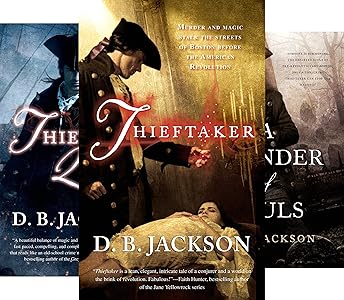Thieftaker is an intriguing new book by D.B. Jackson (penname of David B. Coe) set in pre-Revolutionary Boston. While the novel has its flaws, its unusual setting, winning characterizations, and unique mix of historical fiction, mystery (with a real noir tinge) and fantasy mostly make up for relatively middling plotting and left me looking forward to spending more time in this world.
Ethan Kaille is an independent thieftaker in a 1765 Boston roiling with pre-War tension between loyalists and the patriots newly angered by passage of the Stamp Act. He is also a “conjurer” — one of the few who can use spells — though he must be cautious in his use of magic as his fellow Bostonians are wary of “witchery” and are known to imprison, banish, or even burn “witches.” It doesn’t help his reputation that over a decade ago he was convicted of mutiny and sentenced to brutally harsh labor in the Indies, the psychological and physical damage of which he is still dealing with.
The precipitating event of the novel is the murder of a young upper-class girl the night of some riots against the Stamp Act. Ethan is hired by the girl’s well-known father and soon finds himself over his head against another conjurer whose goals Kaille cannot fathom, though it’s quickly clear the conjurer will do anything to achieve them. Worse, Ethan’s acceptance of the job puts him in the doghouse with the city’s chief thieftaker, Sephira Pryce, who makes it clear his moving up in the thieftaker world is not without its perils. To stay alive, Ethan has to hold off Pryce, defeat a more powerful conjurer, and navigate his way through the turbulent politics of the period.
 As mentioned, Thieftaker is part mystery, part historical fiction, part fantasy. The weakest aspect is probably the mystery. The plot points are relatively pedestrian, Kaille a bit too obtuse in too many places (even if he himself tells us “I’m an idiot), and the whole thing climaxes with a stock villain monologue whereby the antagonist explains too much and takes too long to do what he needs to do.
As mentioned, Thieftaker is part mystery, part historical fiction, part fantasy. The weakest aspect is probably the mystery. The plot points are relatively pedestrian, Kaille a bit too obtuse in too many places (even if he himself tells us “I’m an idiot), and the whole thing climaxes with a stock villain monologue whereby the antagonist explains too much and takes too long to do what he needs to do.
The fantasy elements I had mixed feelings about. I really liked the way conjuring was actually performed and the way it was filled in as we went through the novel. At times, however, it felt a little too powerful and too broad, as with healing, though Jackson does a nice job of putting Ethan in positions where he can’t fully use his healing ability.
The historical fiction leg of the stool serves the story better. Jackson (Coe) has clearly done his research on the physical setting — we get lots of vivid and precise details regarding streets, buildings and the like, all feeling a natural part of the story. We also get a sense of the food, dress, trades, and the like. Politics is a constant drumbeat in the background, ratcheting up the tension as we’re introduced to a slew of historical figures, ranging from the unknown, the semi-recognizable, and the utterly famous (Sam Adams for instance). I would have liked a few more small, domestic details, and a bit more in terms of sensual detail beyond the physical for a more full sense of the time — I felt grounded in the time and place but not in it — but it’s such an exciting, intriguing time that it I didn’t care much.
The real strength of Thieftaker, though, lies in its characterization. Rather than the usual young or sheltered protagonist awakened to a world of danger and/or magic, Ethan is delivered up sort of in media res — he’s already loved and lost, he’s mutinied and failed, he’s been tried/convicted and served his sentence, he’s run into a conjurer villain who gave him lots of trouble and then escaped (a different one than this book’s villain). He’s lived an entire life already. All these interesting tidbits of his past make him a more intriguing and a more fully realized character.
The same is true for the way he is caught between so many sides: between two women, between Britain and America, between the desires of his powerful employer and the anger of the equally powerful Sephira, between two family members, and other opposing forces.
Another excellent character with a similar “between-ness” is Pell, a priest whom Ethan recruits to help in his investigation. Pell is caught between his church teachings and what he sees, between his churchly calling and his own personality. He might have been my favorite character in the entire book. But other characters, ones whom I assume we’ll certainly see again in a follow-up, are equally winning, especially the several strong female characters, which include Sephira (who is pretty much a step ahead of Ethan the whole way), Ethan’s significant other Kannice, who runs her own tavern and does so with an iron will, and Ethan’s former love.
While I wasn’t, as mentioned, so impressed with the mystery plot, the characters carried me along and I enjoyed the setting through which they carried me. Thieftaker clearly leaves off with the possibility of more adventures with Ethan Kaille and while I hope the plotting improves, I’ll look forward to it.




I think I’ll try this series. Thanks, Bill!
This sounds promising. Thanks for sharing it with us, Bill.